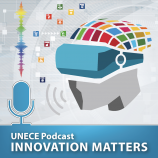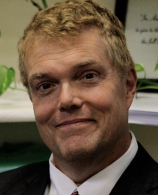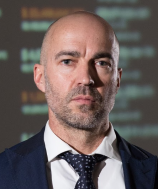
Introduction
Innovation Matters is a new UNECE podcast series that explores how innovation, or experimentation with ideas to create value, is changing our world and could drive progress towards the Sustainable Development Goals in the UNECE region and beyond.
As UNECE member states work to progress towards sustainable development goals, the importance of innovation as a leading driver has grown. Systematically trying out new ideas to create value, govern, and organize society to the benefit of all is essential to find out what works and what does not. These ideas are especially important to address potential challenges and trade-offs, such as the need to reduce poverty while protecting the environment and sustainably using valuable resources.
Innovation is transforming our societies swiftly and affecting a range of sectors and segments of society. Many foresee within the near future a radically different world where large swathes of economic activity have been automated, where autonomous, electric vehicles have made our cars obsolete, and where physical barriers to work have almost disappeared. This, of course, creates enormous opportunities – but also poses challenges, especially for UNECE member states with economies in transition. People are increasingly worried about rising inequality, the decline of steady employment and perhaps even most low- and medium-skilled jobs, and concentration of power and influence among the likes of Google, Amazon, and Apple. As the COVID-19 pandemic has alerted us to risks ahead and constrained the already limited financial resources that many UNECE countries have, countries face, now more than before, the imperative to promote innovation and to do so efficiently.
This podcast series aims to help UNECE policymakers and other stakeholders better understand how innovation is transforming our world and what potential opportunities and challenges lie ahead. The episodes engage leading experts on different topics related to innovation, such as the platform economy, the fourth industrial revolution, and the rise of autonomous vehicles.
Innovation Matters is produced by the UNECE Division of Economic Co-operation and Trade under sub-program 4 on Economic co-operation and integration. Episodes will be released twice a month.
Podcast is available on:
SoundCloud, Spotify, Apple Music, and Amazon Music.
Subscribe below and stay tuned for forthcoming episodes on the fourth industrial revolution, the rise of autonomous vehicles, and many more.
If you have any comments or suggestions, please contact us via [email protected].
*The views and opinions expressed in the Innovation Matters podcast are those of the guests and do not necessarily reflect the official views of UNECE.
Episodes
-
Open Innovation: The New Imperative for Creating and Profiting from Technology (Henry Chesbrough, 2006)
-
Open Business Models: How To Thrive In The New Innovation Landscape (Henry Chesbrough, 2006) Open Innovation
-
Strategy and Structure Chapters in the History of the American Industrial Enterprise (Alfred D. Chandler Jr., 1962)
-
On Competition (Michael E. Porter, 2008)
- Episode 7: Jason Potts on the Innovation Commons
- Episode 8: Susan Borras on Cities as test-beds for innovation to drive sustainable development
- Episode 14: Steven Kotler on the Future of technologies and transformations
- Episode 20: Mark Tylor on Politics of Innovation
- UNECE publication on People-Smart Sustainable Cities (2021)
- Rules for a Flat World: Why Humans Invented Law and How to Reinvent It for a Complex Global Economy (Gillian Hadfield, 2016)
- Episode 1. Prof. Michael Munger on the platform economy – revolutionising how we produce, consume and progress towards a circular economy
-

By radically expanding the potential for all of us to make use of resources and excess capacity, digital platforms open up a range of opportunities for UNECE countries – not only for consumption, jobs, and entrepreneurship. In the context of the circular economy transition, the platform economy is potentially one of the most important transformations of our era. By enabling people to transact in ways previously unimaginable, digital platforms present a range of opportunities – and despite their rapid rise, we are likely only to have scratched the surface. How can we all reduce poverty, ensure economic growth and social inclusion for everyone while managing our resources in a sustainable fashion, as outlined in Sustainable Development Goal 12? The platform economy is one of the ways in which we can resolve this apparent conflict: using capacity better promises a range of possibilities to expand consumption opportunities while keeping resource use sustainable.

Professor Michael Munger To help us understand what the platform economy is and why it is so transformational, this pilot episode of Innovation Matters welcomes one of the most distinguished experts in the area, Professor Michael Munger of Duke University. Based on his book “Tomorrow 3.0”, Professor Munger lays out the enormous potential of platforms to bring together potential supply and demand in manifold ways, making it possible for people to share and exchange in ways that were unthinkable just two decades ago. In this podcast, we will discuss the nature and dynamics of the platform economy, its potential, its long-term impact on the role of public policy, both to enable and catalyze platform-based activities in the context of the Sustainable Development Goals, as well as managing potential trade-offs and defining the role of government.
Episode is available on:
SoundCloud, Spotify, Apple Music, Amazon Music.
This week's focus:
- Tomorrow 3.0: Transaction Costs and the Sharing Economy by M. Munger (2018)
- The Sharing Economy: Its Pitfalls and Promises by M. Munger (2021)
Additional relevant publications:
- The Long Tail by M. Andreessen (2006)
- The Nature of the Firm by R. Coase (1937)
- Cell phones, not factories by T.Cowen (2016)
- A ‘Good’ Industrial Policy is Impossible: With an Application to AB5 and Contractors by M. Munger (2021)
- The Sharing Economy: The End of Employment and the Rise of Crowd-Based Capitalism by A. Sundararajan (2016)
Relevant UNECE work
Circular Economy
- UNECE’s 69th Commission session devoted to circular economy where governments share concrete engagements for circularity and harness cooperation at UNECE
- UNECE policy brief Building Back Better: using platforms to enable sharing and progress towards the Circular Economy from the Informal consultations of the Team of Specialists on Innovation and Competitiveness Policies (ToS-ICP)
- The concept note from the Regional Forum on Sustainable Development for the UNECE Region, focusing on circular economy and innovation for sustainable value chains, outlining the policy dialogue and country case studies on implementing the SDG 12 (Responsible Consumption and Production)
- The ToS-ICP report outlining the outcomes of the policy discussions on how the circular economy model could be implemented with the help of innovation-related policy interventions
Innovation Policy Outlook (IPO)
- The 10-page summary of the IPO publication analyzing innovation policy reform efforts of the Eastern Europe and South Caucasus region
Fourth Industrial Revolution
- The policy note from ToS-ICP reviewing the nature of, the potential impact of, and consequences for innovation policies and institution of the Fourth Industrial Revolution
The United Nations Center for Trade Facilitation and Electronic Business (UN/CEFACT):
- The main page of UN/CEFACT, the focal point within the UNECE on trade facilitation recommendations and electronic business standards, outlining its key areas of work and current projects
Food Loos and Waste
- The webpage of the UNECE Working Party on Agricultural Quality Standards including the latest UNECE tools to combat food loss and waste
- Episode 2. Dr. Alexandr V. Gevorkyan on Post-Socialist transition 30 years on: the importance of furthering broad innovation to progress towards Agenda 2030
-

Since the fall of the Soviet Union, UNECE countries in Eastern Europe, South Caucasus, and Central Asia have been undergoing the transition process from centrally planned economies to market economies. 30 years later, post-Soviet countries had varied success in reaching an increasingly market economy, bringing interesting findings of how economic development for sustainable development, and innovation policy, in particular, is dependent upon the foundation and the ongoing transition process for UNECE countries.

Dr. Aleksandr V. Gevorkyan To examine the transition process and the different outcomes for economic policy across these countries, the guest for this episode is Dr. Aleksandr V. Gevorkyan from St. John’s University in New York. Dr. V. Gevorkyan’s research areas include macroeconomic policy, economic development, labour migration, with a distinct focus on post-Socialist transition economies. Based on his book “Transition Economies: Economic Transformation, Development and Society in Eastern Europe and the Former Soviet Union” (2018), Dr.Gevorkyan traces the economic development process, assessing these countries based on the socialist path they have had, the nature of institutional and structural change affecting the countries in transition before and after the fall of communism. In this podcast, we further discuss how these countries historically evolved in their economic policies and development, the role of central planning and its impact on innovation, the reform efforts and the role of institutions throughout this process.
Episode is available on:
SoundCloud, Spotify, Apple Music, Amazon Music.
This week's focus:
Transition Economies: Transformation, Development, and Society in Eastern Europe and the Former Soviet Union by Aleksandr Gevorkyan (2018)
Additional relevant publications:
- Farm to Factory: A Reinterpretation of the Soviet Industrial Revolution by R. C. Allen (2009)
- Transition Economies by A. Aslund (n.d.)
- Lessons from Reforms in Central and Eastern Europe in the Wake of the Global Financial Crisis by A. Aslund (2012)
- Why Growth in Emerging Economies is Likely to Fall by A. Aslund (2013)
- From the Soviet Bloc to the European Union by I. Berend (2009)
- Transition Report 2020-2021: “The State Strikes Back” by the European Bank for Reconstruction and Development (2020)
- A Quarter Century of Post-Communism Assessed by M.S. Fish, G. Gill, M. Petrovic (editors, 2017)
- The legends of the Caucasus: Economic Transformation of Armenia and Georgia by A.V. Gevorkyan (2015)
- How History Matters in Post-Socialist Economies by A.V. Gevorkyan (2018)
- Poverty in “Transition”: 30 Years After and in the Pandemic by A.V. Gevorkyan and J. Assa (2021)
- 25 Years of Reforms in Ex-Communist Countries by Oleh Havrylyshyn, Xiaofan Meng, and Marian L. Tupy (2016)
- The Economic History of Eastern Europe 1919-75 by M. C. Kaser and E. A. Radice (1986)
- The Socialist System: The Political Economy of Communism by J. Kornai (1992)
- Book review: Transition Economics. Transformation, Development, and Society in Eastern Europe and the Former Soviet Union by John Marangos (2021)
- Strategies of Economic Development by V. Popov (2011)
- War and socialism: Why Eastern Europe Fell behind between 1950 and 1989 by T. Vonyo (2017)
Relevant UNECE work:
Innovation Policy Outlook (IPO):
- The 10-page summary of the IPO publication analysing innovation policy reform efforts of the Eastern Europe and South Caucasus region
- The IPO’s Chapter I on the central role of innovation in the transition towards sustainable development
- Episode 3. Dr. Xavier Cirera and Prof. William Maloney on innovation paradox: innovation in transition economies
-

Given that the potential returns of innovation in developing and catch-up economies are large, why is there so little investment in innovation? This “innovation paradox” is at the centre of this episode. Despite the enormous potential of innovation, especially gradual innovation building on ideas and technologies that have proven their mettle elsewhere, and despite, in many countries, strong political commitment, UNECE transition economies struggle to innovate in ways that drive productivity growth and sustainable development.

Dr. Xavier Cirera 
Professor William Maloney Why do good ideas not necessarily translate into innovation, and what can developing countries do about it? We decided to ask this and many other questions to Dr. Xavier Cirera and Professor William Maloney, the economists from the World Bank. In their book called “The Innovation Paradox: Developing-Country Capabilities and the Unrealized Promise of Technological Catch-up”, they examine the nature of innovation in developing countries, the innovation paradox, and what governments can do to resolve the innovation policy dilemma. In this podcast, the authors dissect these elements of why countries do not get the expected rate returns from follower countries to catch up, and what developing countries can do to boost innovation.
Episode is available on:
SoundCloud, Spotify, Apple Music, Amazon Music.
This week's focus:
-
The Innovation Paradox: Developing-Country Capabilities and the Unrealized Promise of Technological Catch-Up by X. Cirera and W. Maloney (2017)
Additional relevant publications:
- Innovation: A Very Short Introduction by M. Dodgson and D. Gann (2018)
- The Politics of Innovation: Why Some Countries Are Better Than Others at Science and Technology by M. Taylor (2016)
- Unleashing Prosperity: Productivity Growth in Eastern Europe and the Former Soviet Union by the World Bank (2008)
- Innovation Policy: A Guide for Developing Countries by the World Bank (2010)
Relevant UNECE work:
- The publication Innovation Policy Outlook assessing and benchmarking the scope, quality and effectiveness of innovation policies in Eastern Europe and South Caucasus
- The publication Innovation for Sustainable Development Review of Georgia analysing the country’s innovation-driven growth
- The handbook on supporting innovative high-growth enterprises in Eastern Europe and South Caucasus to enable the sub-region to design effective policies and institutions
-
- Episode 4. Prof. Ken Coates and Prof. Carin Holroyd on the rise of the global digital economy and the lessons transition economies could learn from East Asia
-

Often referred to as the Internet or New Economy, the digital economy offers remarkable ways of channelling business through consumers using the Internet. Each day, billions of people connect with others, purchase services from businesses – all within a click of a button from their electronic devices. These new, rapidly unfolding processes and forms of content, distributed in a variety of digital formats, offer salient opportunities and scope for innovation. The digital economy has been forming a unique part of the global economy that is far too difficult to ignore – but what is the government’s role in supporting the evolution and promotion of the digital economy?

Professor Ken Coates 
Professor Carin Holroyd In this episode, Professor Carin Holroyd and Professor Ken Coates, both from the University of Saskatchewan, will explore the nature, implications, potential and risks of the government’s policy in the digital economy. Based on the author’s publication, The Global Digital Economy: A Comparative Policy Analysis, governments still tend to underestimate and misunderstand the economic potential of the digital content sector due to their old mindsets about the traditional industrial economy. Governments still may not know how to support digital content companies – although this is changing in light of the successes of Apple, Google, Amazon, Meta, and the like. As our guests show, experiences from the frontrunners in East Asia – most notably from Japan, South Korea, Malaysia, Singapore – provide fascinating opportunities to take a closer look at the public use of digital technologies and to consider government policies and efforts to expand the sector.
Episode is available on:
SoundCloud, Spotify, Apple Music, and Amazon Music.
This week's focus:
-
The Global Digital Economy: A Comparative Policy Analysis by C. Holroyd (2015)
Additional relevant publications:
- Digital Economy Report 2021 by UNCTAD (2021)
Relevant UNECE work:
- Publications about the governments’ national innovation strategies in the Republic of Moldova, Georgia and Kyrgyzstan
- Rising Product Digitalisation and Losing Trade Competitiveness by UNCTAD (2017)
-
- Episode 5. Dr. Charles Edquist on Holistic innovation policy and governance of national innovation systems
-

As Paul Krugman once said, “productivity is not everything, but in the long run, it is almost everything”. Surely, productivity is the most important source of social and economic welfare, but innovation is also the most important source of productivity growth. The difficulty with the innovation processes is that they are evolutionary; we do not know exactly where they are going, and we cannot predict them.

Dr. Charles Edquist To understand how innovation works, the Systems of Innovation approach has emerged – a perspective with strong roots in the Schumpeterian and Austrian schools of economics. Putting this approach into practice, however, has been difficult. One of the most recognised experts in this field, Dr. Charles Edquist from Lund University, has worked on a model that could provide guidance: a holistic view of the innovation policy. In this podcast, we ask Charles about how this approach to innovation can enable us to understand innovation better, what the determinants of innovation processes are, and how they can strengthen innovation systems, especially as the basis for good policymaking.
Episode is available on:
SoundCloud, Spotify, Apple Music, and Amazon Music.
This week's focus:
-
Towards a holistic innovation policy: Can the Swedish National Innovation Council (NIC) Be a Role Model? by C. Edquist (2019
-
Holistic Innovation Policy: Theoretical Foundations, Policy Problems and Instrument Choices by C. Edquist and S.Borrás (2019
-
Functional Procurement for Innovation, Welfare and the Environment by C. Edquist and J.M. Zabala-Iturriagagoitia (2020)
Additional relevant publications:
-
Innovation: A Very Short Introduction by M. Dodgson and D. Gann (2018)
-
The Entrepreneurial State: Debunking Public vs. Private Myths by M. Mazzucato (2013)
-
The Politics of Innovation: Why Some Countries Are Better Than Others at Science and Technology by M. Taylor (2016)
-
Unleashing Prosperity: Productivity Growth in Eastern Europe and the Former Soviet Union by the World Bank (2008)
Relevant UNECE work:
Innovation for Sustainable Development Reviews (I4SDRs):
- The latest Innovation for Sustainable Development review of Georgia (2021) where the analysis, findings and recommendations of Georgia’s national innovation system are presented using the approach addressing national priorities under the United Nations 2030 Agenda for Sustainable Development
-
- Episode 6. Prof. Cristina Chaminade on Tending local and regional gardens of innovation to accelerate sustainability transition
-

Globally, experts observe drastically different patterns of innovation-driven growth. Unsurprisingly, such diversity of outcomes can be largely attributed to the differences in national innovation systems. Even in the era of globalisation, national policies continue shaping development paths, experimentation opportunities, and the transformative capacity of enterprises. Yet formulating effective national (and regional) innovation policies is not an easy task and requires complex considerations. From local-based preconditions to regional specificities, policymakers have a lot of factors to balance.

Prof. Cristina Chaminade In the sixth episode of UNECE’s Innovation Matters podcast, we welcome Prof. Cristina Chaminade, the Director of the Master’s program in Innovation and Global Sustainable Development at Lund University. Together with Cristina, we will tackle how policymakers can establish regional and local hubs of innovation. Cristina’s main area of expertise lies within the nexus of innovation, sustainable development, and nature conservation. Her research focuses on system transformation in developing countries; Cristina explores how emerging economies can accumulate the competencies that would allow them to upgrade and diversify. Previously, Cristina has researched a diversity of countries, including China, India, South Africa, Thailand, Costa Rica, Brazil, Italy, and Sweden. She has also worked as an expert consultant for international organizations, including the European Commission, UNCTAD, OECD and UN-ECLAC and conservation NGOs.
Episode is available on:
SoundCloud, Spotify, Apple Music, and Amazon Music.
This week's focus:
-
Understanding Process of Path Renewal and Creation in Thick Specialized Regional Innovation Systems. Evidence from Two Textile Districts in Italy and Sweden by C. Chaminade, C. Ballandi, M. Plechero, E. Santini (2019)
Additional relevant publications:
-
Transformative Paths, Multiscalarity of Knowledge Bases and Industry 4.0 by M. Bellandi, C. Chaminade, M. Plechero (2020)
-
The Role of Territorially Embedded Innovation Ecosystems Accelerating Sustainability Transformations: A Case Study of the Transformation to Organic Wine Production in Tuscany (Italy) by C. Chaminade and F. Randelli (2020)
-
Explaining the Past, Predicting the Future: the Influence of Regional Trajectories on Innovation Networks of New Industries in Emerging Economies, Industry and Innovation by M. Plechero, M. Kulkarni, C. Chaminade, B. Parthasarathy (2020)
-
- Episode 7. Prof. Jason Potts on The Innovation Commons: an old idea that will drive transformative innovation
-

Initially, innovation theory and innovation policy were assigned to the industrial economy. The centerpiece of this discussion is the entrepreneur, who is a key actor in the development and diffusion of new products and services. But where does the entrepreneur come from? How are new ideas generated?

Prof. Jason Potts In this episode, we focus on the concept of ‘commons’, known from discussions regarding the governance of natural resources, as a critical concept also to innovation and knowledge creation. Our guest, Jason Potts, Professor of Economics at RMIT University and Co-Director of the Blockchain Innovation Hub at RMIT, explains how innovation derives from processes of cooperation and human coordination, in which a common understanding of the problem at stake is developed. From there emerges, in turn, the entrepreneur. There are, however, several factors, such as trust and clear property rights, that all too often prevent individual actors from sharing critical information. As such, they stall innovation at its earliest stage. In his book "Innovation Commons: The Origin of Economic Growth", Prof. Potts argues that to overcome these obstacles, we need more elaborate governance systems that enable and facilitate cooperation and sharing inputs, ideas, and opportunities.
This is one of two episodes with Prof. Potts. The second one will look more closely at the theory of economic evolution and its implications.
Episode is available on:
SoundCloud, Spotify, Apple Music, and Amazon Music.
This week's focus:
- Innovation Commons. The Origin of Economic Growth by Jason Potts (2019)
Additional relevant publications:
- Innovation Commons: New Innovation Policy for a Digital Economy, Jason Potts (2022)
- The New Evolutionary Microeconomics, Complexity, Competence and Adaptive Behaviour by Jason Potts (2000)
- Episode 8. Prof. Susana Borras on Cities as test-beds for innovation to drive sustainable development
-

When it comes to innovation development, the opinion often gravitates towards a macro-level government-focused perspective. Yet, as we discuss in the next episode of the Innovation Matters podcast, innovation does not only come from national institutions but also from regional governments and even city-level programmes. It is cities that overwhelmingly provide the elements, systems, and dynamism driving innovation. They serve as testbeds, or laboratories, for trying out ideas for entrepreneurship, policies, and partnerships to see what works and what does not. Yet, in the words of today’s guest, “cities are places where the problems are really visible” and where we can address real challenges through small-scale pilots.
![Susana_Borras SMALL[51].jpg](/sites/default/files/styles/max_650x650/public/2022-12/Susana_Borras%20SMALL%5B51%5D.jpg?itok=F8yoX5Al)
Prof. Susana Borrás Considering the importance of cities in fostering innovation, today’s episode analyses their potential impact in solving the most pressing social challenges, ranging from pollution to sustainable energy transition. To guide us in this discussion, we welcome Susana Borrás, a professor at the Department of Organization at Copenhagen Business School, Denmark. Susana researches, among other things, the design of innovation policy and its instruments, the governance of change in socio-technical systems, policy learning, and the capacity of public sector organizations in transformative innovation. In addition to her research activities, Susana Borrás also advises governments and institutions at international, national, and city levels on matters of science, technology, and innovation policy.
Episode is available on:
SoundCloud, Spotify, Apple Music, and Amazon Music.
This week's focus:
- City-Wide Scale-Up of Smart City Pilot Projects: Governance Conditions by L. Bundgaard and S. Borras (2021)
Additional relevant publications:
- The Roles of the State in the Governance of Socio-Technical Systems’ Transformation by S. Borrás and J. Edler (2020)
- Holistic Innovation Policy: Theoretical Foundations, Policy Problems and Instrument Choices by S. Borrás and C. Edquist (2019)
- Smart City Research: A Holistic and State-Of-The-Art Literature Review by F. Zhao, O. I. Fashola, T.I. Olarewaju, and I. Onwumere (2021)
Relevant UNECE work:
- Learn more about the improvement of smart and sustainable urban development through the Key Performance Indicators for Smart and Sustainable Cities (PI4SSC)
- Episode 9. Barbara Diehl on Supporting transformative innovation and entrepreneurship for sustainable development
-

Over the past decades, ECE countries have made significant efforts towards strengthening sustainable growth in line with the United Nations Agenda 2030. Still, many countries in the sub-region are not on track to reach the targets outlined in the Sustainable Development Goals (SDGs). Continuing to bring people out of poverty while managing finite resources and preserving the environment is only possible with innovation that allows us to do and produce more with less. As a result, there is a growing momentum around concepts such as mission orientation, directionality, and the entrepreneurial state - all intended to support a sustainable transformation of our societies.

Ms. Barbara Diehl To better understand the nature of transformative innovation and its' importance for sustainable development, we welcome Barbara Diehl, Chief Partnership Officer at the German Federal Agency for Disruptive Innovation (SPRIND), which was created to look for new answers to the social, ecological, and economic challenges of our time.
Episode is available on:
SoundCloud, Spotify, Apple Music, and Amazon Music.
Relevant publications:
- Please find more about the work of the German Federal Agency for Disruptive Innovation here
- Interview with Barbara Diehl, Chief Partnership Officer at the German Federal Agency for Disruptive Innovation (SPRIND), ROLE MODELS: Barbara Diehl | SPRIND
Relevant UNECE work:
- Please find more about the UN-ECE Transformative Innovation Network (ETIN) that brings together innovation agencies, policy makers, government officials, think tanks, researchers, practitioners, experts, and entrepreneurs mandated to supporting or engaged in transformative innovation in the UNECE region
- Episode 10. Dr. Arthur Diamond on Openness to creative destruction – lessons from the past for the transformative innovation of the future (part 1)
-

How has our life improved through innovation? How has innovation occurred throughout history? How can policies be crafted to encourage innovative entrepreneurs to bring us more innovation? To guide us with these questions, we highly welcome today Professor Arthur Diamond to discuss his book Openness to Creative Destruction: Sustaining Innovative Dynamism. In this podcast, which is the first of 3 episodes, he will start taking us through a narrative of human progress through creative destruction, or innovative dynamism, showing how it has created unprecedented benefits using ample examples and details. He will also demonstrate how such dynamism is far from inevitable and the factors that, then and now, are holding back its potential.

Dr. Arthur Diamond Arthur Diamond studied philosophy and economics at the University of Chicago, where he was also a post-doctoral fellow with Nobel laureate Gary Becker. After Chicago, he was on the faculty at Ohio State University and is now Professor of Economics at the University of Nebraska Omaha. Professor Arthur Diamond wrote the script for “Frank Knight and the Chicago School” in the Great Economic Thinkers series. His “Innovation Unbound” policy brief from the Mercatus Center argues entrepreneurship flourishes when regulations are few, and the “Innovative Dynamism Allows All to Flourish” article on Oxford University Press’s blog argues that entrepreneurial capitalism most benefits the poor and unprivileged. He is a member of the Mont Pelerin Society, a fellow at the Adam Smith Institute, and a senior fellow at the American Institute for Economic Research.
Episode is available on:
SoundCloud, Spotify, Apple Music, and Amazon Music.
This week’s focus:
- Openness to Creative Destruction: Sustaining Innovative Dynamism by Arthur Diamond
Additional relevant publications:
- "Against the Man of System: Innovative Dynamism after Covid-19." by A. Diamond (2021)
- "The Creative Destruction of Labor Policy." by A. Diamond (2014)
- “Innovative Dynamism Allows All to Flourish.” by A. Diamond (2020)
- “Capitalism, Socialism, and Democracy” by Joseph Schumpeter (1942);
- “The Age of Edison: Electric Light and the Invention of Modern America” by E. Freeberg (2015)
- “Capitalism and Freedom” by M. Friedman (1962)
- “Bourgeois Dignity: Why Economics Can’t Explain the Modern World” by D. McCloskey (2010)
- “The Venturesome Economy: How Innovation Sustains Prosperity in a More Connected World” by Amar Bhide (2008)
Relevant UNECE work:
Please find more about how innovation occurs with the UN-ECE Transformative Innovation Network (ETIN) that brings together innovation agencies, policy makers, government officials, think tanks, researchers, practitioners, experts, and entrepreneurs mandated to supporting or engaged in transformative innovation in the UNECE region.
- Episode 11. Prof. Josh Lerner on The role of government in fostering entrepreneurship and innovation
-

In the past decade, there has been a notable rise in government intervention aimed at fostering entrepreneurship and innovation. While some governments have been successful in adopting innovation policies to support entrepreneurial activity, others have fallen short. For this episode, we invited Prof. Josh Lerner to delve into this topic by discussing his book “The Boulevard of Broken Dreams”. Through our discussion, we will explore the historical landscape of government policies and critically analyze their impact on promoting innovation, identifying both positive and negative effects along the way.

Prof. Josh Lerner Much of his research focuses on venture capital and private equity organizations. He co-directs the National Bureau of Economic Research’s Productivity, Innovation, and Entrepreneurship Program. He founded and runs the Private Capital Research Institute, a non-profit devoted to encouraging access to data and research, and has been a frequent leader of and participant in World Economic Forum projects and events. He also established and teaches at Harvard undergraduate, executive, and doctoral courses on venture capital, private equity, and entrepreneurship. He graduated from Yale College with a special divisional major and earned a Ph.D. from Harvard's Economics Department. He was recently recognized as the 37th most influential economist worldwide by Research.com.
Episode is available on:
SoundCloud, Spotify, Apple Music, and Amazon Music.
This week’s focus:
The Boulevard of Broken Dreams by Prof. Josh Lerner (2009)Business Incubators for Sustainable Development in the SPECA Sub-region by UNECE (2021)
Relevant UNECE work:
Additional relevant publications:
A Tale of Two Islands by Lester Picker (2009) - Episode 12. Prof. Philip Auerswald on Shaping long-term societal development
-

We undertake an adventure in intellectual archeology with Prof. Philip Auerswald, discovering villains and heroes in the study of human progress. Drawing from his books The Coming Prosperity and The Code Economy, and nearly three decades of research relating to entrepreneurship, technology, and innovation on a global scale, Prof. Auerswald shines a light on the microstructure of long-term societal development.

Prof. Philip Auerswald Philip Auerswald is a professor at the George Mason University Schar School of Policy and Government and a distinguished member of the academic community. A visionary force in the areas of policy, government, and innovation, he is the founder and coeditor of Innovations, published by MIT Press. He is also the founding board chair and president of the National Center for Entrepreneurship and Innovation, located in Washington, DC. Previously, he lectured at the Kennedy School of Government, Harvard University, where he also acted as assistant director of the Science, Technology, and Public Policy Program. Prof. Auerswald holds a PhD in economics from the University of Washington and a BA in political science from Yale University.
Episode is available on:
SoundCloud, Spotify, Apple Music, and Amazon Music.
This week’s focus:
The Code Economy: A Forty-Thousand Year History by Philip E. Auerswald (2017) The Coming Prosperity: How Entrepreneurs Are Transforming the Global Economy by Philip E. Auerswald (2012)Additional relevant publications:
Philip E. Auerswald and Lokesh Dani (2022), “Entrepreneurial opportunity and related specialization in economic ecosystems,” Research Policy 51:9 (in press). Hezekiah Agwara, Philip Auerswald, and Brian Higginbotham (2014), “Algorithms and the Changing Frontier,” National Bureau of Economic Research (NBER) Working Paper number 20039. Philip Auerswald, Stuart Kauffman, José Lobo, and Karl Shell (2000). “The Production Recipes Approach to Modeling Technological Innovation: An Application to Learning-by-doing,” Journal of Economic Dynamics and Control 24:3, pp. 389-450. - Episode 13. Dr. John Danner on Automation and utopian future
-

In this episode, we embark on an exhilarating exploration of "Automation and Utopia: Human Flourishing in a World Without Work," based on Dr. John Danner's groundbreaking book. As we contemplate the imminent human obsolescence in the face of automation, we question the potential for a utopian future. Dr. John Danaher challenges conventional wisdom and welcomes this transformative development. In this thought-provoking discussion, he invites us to envision a world where work as we know it will cease to exist and contemplates the implications for humanity.

Dr. John Danner Dr. John Danner is a senior lecturer in law at the University of Galway. Holding a PhD from University College Cork, his research revolves around the philosophy of law and emerging technologies, where he has published articles on human enhancement, brain-based lie detection, the philosophy of punishment, and artificial intelligence. Dr. John Danaher is also known for co-editing “Robot Sex: Social and Ethical Implications” and his blog and podcast series called Philosophical Disquisitions.
Episode is available on:
SoundCloud, Spotify, Apple Music, and Amazon Music.
This week’s focus:
Automation and Utopia: Human Flourishing in an Age Without Work by John Danaher (2019) - Episode 14. Steven Kotler on converging technologies and transformation
-

This episode draws from the thought-provoking book "The Future Is Faster Than You Think: How Converging Technologies Are Transforming Business, Industries, and Our Lives," co-authored by our esteemed guest Steven Kotler. Our exploration takes us into the heart of how exponential technologies are poised to reshape our lives fundamentally and drive societal and economic transformative innovation. We will uncover the enormous potential and potential impact of these converging technologies and discuss how they could open unprecedented possibilities for innovation.

Steven Kotler Steven Kotler is an award-winning journalist, entrepreneur, and executive director of the Flow Research Collective. He is the author of 14 books, including four New York Times bestsellers. His work has been nominated for two Pulitzer Prizes, been translated into over 40 languages, and appeared in over 100 publications. At the forefront of exploring the intersection of science, technology, and human potential, Steven Kotler has delved into a wide range of subjects, including neuroscience, and the future of innovation.
Episode is available on:
SoundCloud, Spotify, Apple Music, and Amazon Music.
This week's focus
The Future Is Faster Than You Think: How Converging Technologies Are Transforming Business, Industries, and Our Lives by Peter H. Diamandis & Steven Kotler (2020)
- Episode 15. Adam Thierer on Permissionless innovation (part 1)
-

In this episode, with Adam Thierer, we explore the intricate dynamics of regulation and innovation. Adam will guide us through the evolution of permissionless innovation and its influence on past, present, and future technological progress. Drawing insights from his book "Permissionless Innovation: The Continuing Case for Comprehensive Technological Freedom", we embark on a journey to understand how various advancements have flourished without restrictions and impacted the technologies we rely on today.

Adam Thierer Adam Thierer is a senior research fellow with the R Street Institute’s technology and innovation team. In the past, he served as a senior research fellow at the Mercatus Center at George Mason University from 2010 to 2022. Specializing in Internet, entrepreneurialism, and free-speech matters, he has significantly contributed to understanding emerging technology's public policy implications. Thierer's influence extends to the U.S. Chamber of Commerce's AI Commission on Competitiveness and the Federalist Society’s Regulatory Transparency Project. With a portfolio of authored and edited books, including "Permissionless Innovation" and "Evasive Entrepreneurs," Thierer continues to shape the discourse on innovation, governance, and economic growth.
Episode is available on:
SoundCloud, Spotify, Apple Music, Amazon Music.
This week's focus:
Permissionless Innovation: The Continuing Case for Comprehensive Technological Freedom by Adam Thierer (2016)
- Episode 16. Robin Feldman on Law and incentivizing innovation in an age of digitalization
-

Scientific and technological innovations are forcing the law into the spotlight and revealing its many glaring inadequacies. Professor Robin Feldman explains why protection of invention arrangements causes trouble and, in many ways, ends up acting as a disincentive to innovation. The very nature of inventions makes them impossible to describe unambiguously for all time. When something is so new that we do not yet understand how it works, what it can do, or how it could be applied-as is often the case in biotechnology-description is necessarily slippery. Instead of hoping for clear boundaries, Professor Robin Feldman urges lawmakers to focus on what the law can do well: craft rules that anticipate the bargaining that will occur as rights unfold.
Professor Robin Feldman is a leading expert in health care and access to medicine, particularly as it relates to pharmaceutical competition and innovation. She received a B.A. from Stanford University and a J.D. from Stanford Law School, graduating with the Order of the Coif and receiving the Urban A. Sontheimer Award for graduating second in the class. She served in the Articles Department of the Stanford Law Review. After graduation, Feldman clerked for the Honorable Joseph Sneed of the U.S. Court of Appeals for the Ninth Circuit.

Professor Robin Feldman Professor Feldman is an award-winning scholar whose work has been called “absolutely remarkable” and a “must read.” She has published 4 books and more than 60 articles in law journals as well as in the American Economic Review, New England Journal of Medicine, Annals of Internal Medicine, and Health Affairs. Her 2022 law review piece, Atomistic Antitrust, received two awards for outstanding writing in the antitrust arena. The Congressional Record, the White House, various governmental reports, and court proceedings have cited her work a number of times. In one recent Supreme Court case, briefs in support of both sides cited her work.
Professor Feldman frequently testifies before legislative and regulatory bodies. In addition to governmental proceedings on patents and pharmaceuticals, Professor Feldman has been advising governmental entities on the regulation of AI since 2018, including the GAO’s report to Congress on AI, the Army Cyber Institute’s threat casting exercise, the USPTO session on AI and inventorship, the FTC’s hearing on AI, and the National Academies of Sciences roundtable on AI and life sciences. Professor Feldman appears frequently in the press, giving 700 press interviews over the last decade.
Episode is available on:
SoundCloud, Spotify, Apple Music, Amazon Music.
This week's focus:
Rethinking Patent Law by Robin Feldman (Harvard Univ. Press 2012).Relevant UNECE work
The policy note from ToS-ICP reviewing the nature of, the potential impact of, and consequences for innovation policies and institution of the Fourth Industrial RevolutionAdditional relevant publications:
The bitter lesson by Rich Sutton (2019) Pamela Smuelson Finds Patents a Low Priority for Software Entrepreneurs - Episode 17. Adam Thierer on Permissionless innovation (part 2)
-

In this episode, with Adam Thierer, we will expand on the previous conversation about the present and future of regulation in an era of unprecedented innovation. In Part 2, our focus will be on the contemporary landscape of legislation and the balance between permissionless innovation and effective governance. As the pace of technological advancement accelerates, we'll explore the challenge of reconciling rapid change with the traditional pace of legislation, particularly in the context of digitization and exponential growth.

Adam Thierer Adam Thierer is a senior research fellow with the R Street Institute’s technology and innovation team. In the past, he served as a senior research fellow at the Mercatus Center at George Mason University from 2010 to 2022. Specializing in Internet, entrepreneurialism, and free-speech matters, he has significantly contributed to understanding emerging technology's public policy implications. Thierer's influence extends to the U.S. Chamber of Commerce's AI Commission on Competitiveness and the Federalist Society’s Regulatory Transparency Project. With a portfolio of authored and edited books, including "Permissionless Innovation" and "Evasive Entrepreneurs," Thierer continues to shape the discourse on innovation, governance, and economic growth.
Episode is available on:
SoundCloud, Spotify, Apple Music, Amazon Music.
This week's focus:
Permissionless Innovation: The Continuing Case for Comprehensive Technological Freedom by Adam Thierer (2016)
- Episode 18. Emma Griffin on Innovation in the industrial revolution
-

In the mid-18th century, the modern economy started to take shape. For the first time in human history, innovation surpassed the mercantilism that preceded it. While limited to the invention of the factory system and the boom in the textile sector for the first decades, the Industrial Revolution heralded unprecedented social and economic changes that have made humanity infinitely better off. Marking, in the words of prominent historian Eric Hobsbawn, “the most fundamental transformation of human life in the history of the world," the innovative dynamism and legacy the industrial revolution created are alive and well today. In this episode, Professor Emma Griffin explains what prompted and upheld the industrial revolution and the innovative dynamism it paved the way for – and what we can learn from history on how to sustain innovative dynamism today and in the future.

Emma Griffin Emma Griffin is professor of modern British history at the University of East Anglia and President of the Royal Historical Society. She teaches courses on the social and cultural history of Victorian Britain and is active within the wider historical community. She has been involved in many scholarly publishing ventures, including as the editor of History, Cultural and Social History, and Historical Journal. She currently sits on the board of the popular history magazine, History Today.
Episode is available on:
SoundCloud, Spotify, Apple Music, Amazon Music.
This week's focus:
A short history of the British industrial revolution (Palgrave, 2011)Additional relevant publications:
- Emma Griffin, Liberty’s dawn: a people’s history of the industrial revolution
- Emma Griffin, Patterns of industrialisation (The Victorian World, 2013)
- Joel Mokyr, “The Rise and Fall of the Factory System: Technology, firms, and households since the Industrial Revolution”.
- Eric Hobsbawm, The age of revolution 1749-1848
- Episode 19. Emma Griffin on Life in the industrial revolution
-

In our first episode on the industrial revolution with Professor Emma Griffin, we explored how innovative dynamism, for the first time in the history of our world, changed it radically in a process still going on today. In this second episode, we will talk about what life was like for the working class. Often maligned as squalid and dehumanizing, Emma Griffin's book Liberty’s Dawn has delved into a range of autobiographies, telling a different, much more nuanced story of optimism, perspective, and dynamism.

Emma Griffin Emma Griffin is professor of modern British history at the University of East Anglia and President of the Royal Historical Society. She teaches courses on the social and cultural history of Victorian Britain and is active within the wider historical community. She has been involved in many scholarly publishing ventures, including as the editor of History, Cultural and Social History, and Historical Journal. She currently sits on the board of the popular history magazine, History Today.
Episode is available on:
SoundCloud, Spotify, Apple Music, Amazon Music.
This week's focus:
- Emma Griffin, Liberty’s dawn: a people’s history of the industrial revolution
- A short history of the British industrial revolution (Palgrave, 2011)
Additional relevant publications:
- Emma Griffin, Liberty’s dawn: a people’s history of the industrial revolution
- Emma Griffin, Patterns of industrialisation (The Victorian World, 2013)
- Joel Mokyr, “The Rise and Fall of the Factory System: Technology, firms, and households since the Industrial Revolution”.
- Eric Hobsbawm, The age of revolution 1749-1848
Relevant Innovation Matter episodes and UNECE publications
Soon on Innovation Matters episode with Joel Mokyr on a culture of growth and Rainer Zitelmann on capitalism and innovation
-

In this episode, we delve into the intriguing question of why certain countries excel in innovation while others, with similar resources, do not achieve the same level of success. The discussion explores the varied trajectories of nations like Israel and Estonia, recognized for their innovative prowess, and contrasts them with countries like France and Italy, which, despite significant potential, haven't reached similar heights. This conversation sheds light on the complex factors beyond mere institutions and policies that drive national innovation strategies.

Dr. Mark Zachary Taylor Dr. Mark Zachary Taylor, formerly a solid-state physicist, now specializes in S&T politics and policy. In his research, he investigated the sources of national economic competitiveness. His book, Politics of Innovation (Oxford University Press, 2016), explains why some countries are better than others at science and technology. He also studies the role of the US presidency in short-run economic performance. Prof. Taylor’s research has been published in the journals Foreign Affairs, International Organization, Security Studies, Journal of Business Venturing, Review of Policy Research, Harvard International Review, Journal of Health Politics, Policy, and Law, Presidential Studies Quarterly, and the Journal of Political Science Education. Dr. Taylor holds a Ph.D. in Political Science from MIT, an MA in International Relations from Yale University, a BA in Physics from UC Berkeley, and has attended university in Japan. He currently co-directs the “Pathways to Policy” program in Washington, DC, for the Georgia Institute of Technology.
Episode is available on:
SoundCloud, Spotify, Apple Music, Amazon Music.
This week's focus:
The politics of innovation: why some countries are better than others and science and technology (Mark Zachary Taylor, 2016)Additional relevant publications:
Innovation in Real Places (Dan Breznitz, 2023) - Episode 21. Rainer Zitelmann on capitalism and innovation
-

In this episode of Innovation Matters, we delve into the intricate relationship between capitalism, innovation, and societal progress with the insightful Dr. Rainer Zitelmann. As debates around economic systems continue to shape our world, Dr. Zitelmann's analysis presents capitalism not just as a mechanism for wealth creation, but as a fundamental driver of human advancement and innovation. Through a historical lens and contemporary examples, this episode explores how capitalist dynamics foster technological breakthroughs, economic development, and an improved standard of living for billions globally.

Dr. Rainer Zitelmann Our distinguished guest, Dr. Rainer Zitelmann, is not only a renowned historian and sociologist but also a bestselling author acclaimed for his incisive critiques and defense of capitalist principles. In his latest work, The Power of Capitalism, Dr. Zitelmann compellingly argues for capitalism's unparalleled ability to generate prosperity and drive forward human progress. Join us as we discuss the misconceptions surrounding capitalism, the true nature of monopolies, and the transformative power of free markets, all through the prism of Dr. Zitelmann's extensive research and personal experiences in the realms of academia and entrepreneurship.
Episode is available on: SoundCloud, Spotify, Apple Music, Amazon Music
This week's focus:
The Power of Capitalism (R. Zitelmann, 2018) In Defense of Capitalism (R. Zitelmann 2023)Life behind the Berlin wall (film, R. Zitelmann)
- Poland: From Socialism to Prosperity (film, R. Zitelmann)
Additional relevant publications:
Hitler’s National Socialism (R. Zitelmann, 2022) - Episode 22. Anders Kärnä on Innovation Policy
-

In this episode of Innovation Matters, we delve into the complex interplay between government policies, market dynamics, and transformative innovation with the esteemed Dr. Anders Kärnä. As we navigate through the nuances of economic development and public policy, Dr. Kärnä offers a critical analysis on how governments can either foster or hinder innovation through industrial policies. Drawing from historical examples and current economic theories, this episode explores the delicate balance between governmental intervention and market freedom that underpins successful innovation ecosystems worldwide.
Dr. Anders Kärnä, an affiliated researcher at the Research Institute of Industrial Economics, specializes in the intricate dynamics between government policy and economic innovation. His expertise lies in evaluating the effectiveness of government interventions in markets and their impact on entrepreneurship and economic growth. With a rich academic and policy-making background, Prof. Kärnä offers deep insights into how policies can either foster or stifle economic development and technological innovation, making him a pivotal voice in discussions on optimizing governmental roles in economic strategies. Join us as he shares his perspectives on the complex interplay of regulation, economic freedom, and innovation in shaping prosperous societies.
Episode is available on:
Sound Cloud, Spotify, Apple Music, Amazon Music
- Episode 23. Alex Tabarrok on Innovation Renaissance
-

Innovation has created unimaginable wealth and opportunities over the past two centuries, and since the mid-20th century in particular. But over the past decades, many point to stagnating productivity and the concern that, maybe, the massively transformative changes brought on by train travel, telephones, air travel, and antibiotics may have been one-offs, and we may not see them again. That makes it all the more important to aim for a fundamental reconceptualization and rebirth of innovation for the future.

In this episode, we have the honour of welcoming Prof. Alex Tabarrok, author of "Launching the Innovation Renaissance." He argues that by embracing a culture of growth and significantly reforming education, intellectual property laws, and bureaucratic regulations, societies can reignite the kind of innovation that drives substantial economic advances and improves the standard of living worldwide. Prof. Alex Tabarrok holds the Bartley J. Madden Chair in Economics at the Mercatus Centerand is a professor of economics at George Mason University.
Episode is available on:
Sound Cloud, Spotify, Apple Music, Amazon Music
This week's focus:
- Launching the Innovation Renaissance (Alex Tabarrok, 2011)
Relevant Innovation Matter episodes and UNECE publications
- Alex Tabarrok's Home page
- Marginal Revolution blog
- The Great Stagnation (Tyler Cowen, 2011)
- The Rise and Fall of American Growth (Robert J. Gordon, 2017)
- The Case against Education (Bryan Caplan, 2019)
- Injecting Charter School Best Practices Into Traditional Public Schools (Roland G. Fryer, Jr., 2014)
- Who Becomes an Inventor in America? The Importance of Exposure to Innovation (with Alex Bell, Xavier Jaravel, Neviana Petkova, and John Van Reenen), Quarterly Journal of Economics, 134(2): 647-713, 2019.
Relevant Innovation Matter episodes and UNECE publications
- Episode 14: Steven Kotler on Converging Technologies and Transformation
- Episode 15: Adam Thierer on Regulation and innovation (Part 1) ,
- Episode 17: Adam Thierer on Regulation and innovation (Part 2)
- Forthcoming Episode on Innovation Matters: Joel Mokyr on “A Culture of Growth”
- Episode 24. Henry Chesbrough on Open Innovation
-

In the past two decades, Open Innovation and its relatives, such as Open Science, have come to the fore as a paradigm contrasting with the view of innovation as something emerging from within firms. Referring to the practice of sourcing ideas from external sources and sharing valuable information widely, Open Innovation is essential to the creation of a broader innovation commons and to understanding a range of emergent phenomena that turn the traditional view on its head. That potential is set to continue growing, as we learn more and more about how to make better use of digital and frontier technologies.

In this episode of Innovation Matters, we are honored to host Prof. Henry Chesbrough , the much vaunted “founder of open innovation” and author of "Open Innovation: The New Imperative for Creating and Profiting from Technology." Prof. Chesbrough explores the evolution of Open Innovation, its practical implications, and its potential to bridge the gap between technological potential and tangible societal benefits. He delves into the successes of companies like Philips, Xerox Park and Enel, illustrating its transformative potential in practice.
Prof. Henry Chesbrough is the Berg Professor of Open Innovation and Sustainability at LUISS University of Rome. With a rich background in both industry and academia, he has been instrumental in defining and advancing the Open Innovation paradigm.
Episode is available on:This week's focus:
- Open Innovation: The New Imperative for Creating and Profiting from Technology (Henry Chesbrough, 2006)
- Open Business Models: How To Thrive In The New Innovation Landscape (Henry Chesbrough, 2006)
- Open Innovation
Relevant Innovation Matter episodes and UNECE publications
- Episode 7: Jason Potts on the Innovation Commons
- Episode 8: Susan Borras on Cities as test-beds for innovation to drive sustainable development
- Episode 14: Steven Kotler on the Future of technologies and transformations
- Episode 20: Mark Tylor on Politics of Innovation
- UNECE publication on People-Smart Sustainable Cities (2021)
- Episode 25. Jason Potts on Exploring the Evolutionary Theory of Economics
-

We often see innovation as a linear process – from basic research over invention to innovation. But is that how knowledge develops and how innovation works? Could the concept of evolution help elucidate the dynamics better? How would such a perspective explain how knowledge evolves into, adapts to, and underpins societal and economic transformation? And what does that mean in practice, for entrepreneurship, policy, and how society works?

That is what we will delve into in this second episode of Innovation Matters with Prof. Jason Potts Based on his book "The General Theory of Economic Evolution," Prof. Potts explains the importance of understanding the evolutionary nature of knowledge and how this perspective can inform policies that support more experimentation and learning.
Prof. Jason Potts is a leading economist known for his work on the Innovation Commonsand the application of evolutionary theory to economics. He is a professor at the Royal Melbourne Institute of Technology. His insights provide a fresh and transformative framework for understanding the dynamics of knowledge and innovation in the economy.
Episode is available on:
SoundCloud Spotify Apple Music Amazon Music
This week's focus:
- The General Theory of Economic Evolution (Jason Potts, 2008)
- Innovation Commons: the origin of economic growth (Jason Potts, 2019)
- Evolutionary Economics (Jason Potts, 2003
Additional relevant publications:
- The Wealth of Nations (Adam Smith, 1776)
- The Road to Serfdom (Friedrich Hayek, 1944)
- The Hayekian Trandition and Emergent The Cost of Light (William Nordhaus, 1998)
- Superabundance: The Story of Population Growth, Innovation, and Human Flourishing on an Infinitely Bountiful Planet Hardcover (Marian Tupy, 2022)
- Capitalism, Socialism and Democracy (Joseph Alois Schumpeter)
- 50 Things Your Smartphone Replaced [Or Will Replace In The Future]
- Report on the World Summit on the Information Society Stocktaking (ITU, 2005)
- A New Economics to Save the Earth: A Buddhist Perspective
- Understanding the Blockchain Economy: An Introduction to Institutional Cryptoeconomics (Chris Berg,Sinclair Davidson, Jason Potts, 2020)
- Blockchain is as revolutionary as electricity: Big Ideas with Jason Potts (Andrew Fenton, 2021)
Relevant Innovation Matter episodes and UNECE publications
- Episode 1: Michael Munger on the Platfrom Economy
- Episode 7: Jason Potts on the Innovation Commons
- Episode 13: John Danner on Automation and Utopan Future
- Episode 26. Marian Tupy on Resource Efficiency and Availability
-

For all of recorded history, humanity has often feared that our burgeoning population would eventually outstrip the earth's resources, leading to widespread scarcity and catastrophe. This Malthusian perspective, named after Thomas Malthus who predicted that exponential population growth would surpass linear agricultural growth, has influenced much of the discourse on sustainability, overpopulation, and environmental degradation. Despite the world's population soaring, standards of living have vastly improved, and absolute poverty has significantly declined. This paradoxical state, where resources seem to increase as we consume more, is what we now call "Superabundance."

In this episode of Innovation Matters, we welcome Marian Tupy, a Senior Fellow at the Cato Institute’s Center for Global Liberty and Prosperity, and co-author of "Superabundance: The Story of Population Growth, Innovation, and Human Flourishing on an Infinitely Bountiful Planet." Together, we explore how innovation and human ingenuity have been instrumental in expanding our resource base and improving living standards. The discussion highlights historical and contemporary examples that challenge the traditional Malthusian perspective, demonstrating how resource availability and efficiency have increased alongside population growth. We also delve into the broader implications of these findings for sustainability and future development.
Our guest, Marian Tupy, is a Senior Fellow at the Cato Institute’s Center for Global Liberty and Prosperity. Co-author of "Superabundance," he focuses on how economic and political freedom drive human progress. His work highlights how innovation increases resource abundance, providing an optimistic view of our future and the role of technology in addressing today’s challenges.
Episode is available on:
SoundCloud Spotify Apple Music Amazon Music
This week's focus:
- Superabundance: The Story of Population Growth, Innovation, and Human Flourishing on an Infinitely Bountiful Planet (Marian Tupy, 2022)
Additional relevant publications:
- The Geek Way: The Radical Mindset that Drives Extraordinary Results (Andrew McAfee, 2023)
- More from Less: The Surprising Story of How We Learned to Prosper Using Fewer Resources―and What Happens Next (Andrew McAfee, 2019)
- The infamous overpopulation bet: Simon vs. Ehrlich - Soraya Field Fiorio
- An Essay on the Principle of Population (Thomas Malthus, 1798)
- The Bet: Paul Ehrlich, Julian Simon, and Our Gamble over Earth's Future (Paul Sabin, 2013)
- The Simon Abundance Index: A New Way to Measure Availability of Resources (Marian Tupy, 2018)
- Do Real-Outputs and Real-Wage Measures Capture reality? The History of Lighting Suggest Not (William Nordhaus, 1998)
- How Innovation Works: And Why It Flourishes in Freedom (Marr Ridley, 2020)
- Apocalypse Never: Why Environmental Alarmism Hurts Us All (Michael Shellenberger, 2020)
- Average Is Over: Powering America Beyond the Age of the Great Stagnation (Tyler Cowen, 2013)
Relevant Innovation Matter episodes and UNECE publications
- Episode 27. Arthur Diamond on Innovative Dynamism
-

In today's fast-changing world, innovative dynamism—where technological advancements drive significant transformation—has become a major force in shaping progress. From the industrial revolution to the digital era, innovation has redefined economies and societies, offering new opportunities and challenges. However, balancing the promotion of innovation with the need for responsible oversight remains a key issue for governments, businesses, and communities.

In this episode of Innovation Matters, esteemed economist and author Professor Arthur Diamond returns to share his insights on innovative dynamism. Diamond explores the historical evolution of innovation, comparing the more open, dynamic environment of the 19th century with the increasing role of state-led regulation that emerged in the 20th century, particularly after World War II. The discussion examines how regulation and central planning have influenced innovation, the lessons learned from technological breakthroughs like electric and autonomous vehicles, and how societies can find the right balance between encouraging innovation and ensuring responsible governance.
Arthur Diamond studied philosophy and economics at the University of Chicago, where he was a post-doctoral fellow with Nobel laureate Gary Becker. He is currently a Professor of Economics at the University of Nebraska Omaha. Diamond is known for his contributions to the Great Economic Thinkers series and his work on entrepreneurial capitalism, including his “Innovation Unbound” policy brief and articles advocating for fewer regulations to boost entrepreneurship. He is a member of the Mont Pelerin Society and a senior fellow at both the Adam Smith Institute and the American Institute for Economic Research.
Episode is available on:
SoundCloud Spotify Apple Music Amazon Music
This week's focus:
- Openness to Creative Destruction: Sustaining Innovative Dynamism (Arthur Diamond, 2019)
- Economic Growth through Disruptive Innovation (Arthur Diamond, 2018)
Relevant Innovation Matter episodes and UNECE publications
- Episode 28: Chris Berg on New Frontier for Global Innovation
-

In recent years, the discourse surrounding blockchain technology has frequently been eclipsed by the prominence of cryptocurrencies such as Bitcoin. However, beyond the headlines and the inherent volatility of these digital assets, blockchain technology possesses the profound capacity to revolutionize multiple facets of our economy and society. Its decentralized architecture, which operates independently of a central authority, facilitates a wide array of applications that extend far beyond the realm of digital currencies.
In this episode of Innovation Matters, we are honored to host Professor Chris Berg, an economist at the Royal Melbourne Institute of Technology (RMIT) and co-author of "Understanding the Blockchain Economy: An Introduction to Institutional Cryptoeconomics." Professor Berg explores the concept of blockchain as a decentralized database, emphasizing its potential to transform global trade, social media, and even the integration of AI technologies. He delves into the current challenges, such as regulatory uncertainties and the complexities of building decentralized networks, while maintaining an optimistic view on the future of the blockchain economy.
Professor Chris Berg is a leading expert in the field of cryptoeconomics, having founded the RMIT Blockchain Innovation Hub. His work focuses on the intersection of economics, technology, and public policy, making him a key figure in understanding the broader implications of blockchain technology.
Episode is available on:
SoundCloud Spotify Apple Music Amazon Music
This week's focus:
-
Understanding the Blockchain Economy: An Introduction to Institutional Cryptoeconomics (Chris Berg, 2019)
Additional relevant publications:
-
Report on the Blockchain Pilots Project for the Garment and Footwear Sector (UNECE, 2022)
-
Harnessing the potential of blockchain technology for due diligence and sustainability in cotton value chains, Policy brief (UNECE, 2021)
Relevant Innovation Matter episodes and UNECE publications:
- Episode 1: Prof. Michael Munger on the platform economy – revolutionizing how we produce, consume and progress towards a circular economy.
- Episode 14: Steven Kotler on converging technologies and transformation
-
- Episode 29: Gillian Hadfield on Future of Legal Infrastructure
-

As the pace of technological change accelerates, the limitations of our existing legal systems are becoming increasingly apparent. Traditional frameworks, designed for a slower and less complex world, struggle to keep up with the challenges posed by globalization, digitalization, and emerging technologies. There is a growing need for innovative approaches to lawmaking that can support both the rapid pace of innovation and the protection of societal values.

In this episode of Innovation Matters, we are honored to host Professor Gillian Hadfield from the University of Toronto, a leading voice in the field of legal theory and author of "Rules for a Flat World: Why Humans Invented Law and How to Reinvent It for a Complex Global Economy." Professor Hadfield discusses the importance of reimagining legal infrastructure to better align with the demands of our rapidly changing world. She explores the concept of using market mechanisms to drive legal innovation, emphasizing how regulatory markets can help create more responsive and effective legal systems.
Professor Gillian Hadfield is a distinguished scholar whose work focuses on the intersection of law, technology, and economic development. Her insights into how we can harness creativity and market dynamics to improve legal rule-making are essential for understanding the future of governance in the digital age.
Episode is available on:
SoundCloud Spotify Apple Music Amazon Music
This week's focus:
- Rules for a Flat World: Why Humans Invented Law and How to Reinvent It for a Complex Global Economy(Gillian Hadfield, 2016)
Additional relevant materials:
- Episode 30: Gillian Hadfield on Legal Infrastructure for a Flat World (Part 2)
-

As the pace of technological change accelerates, the limitations of our existing legal systems are becoming increasingly apparent. Traditional frameworks, designed for a slower and less complex world, struggle to keep up with the challenges posed by globalization, digitalization, and emerging technologies. There is a growing need for innovative approaches to lawmaking that can support both the rapid pace of innovation and the protection of societal values.

In this episode of Innovation Matters, we are joined once again by Professor Gillian Hadfield at the University of Toronto and author of "Rules for a Flat World: Why Humans Invented Law and How to Reinvent It for a Complex Global Economy." In Part 2, Professor Hadfield further elaborates the critical role of legal infrastructure in supporting innovation, arguing that to foster creativity and growth in today’s fast-moving world, we must rethink how legal rules are created, enforced, and adapted.
Professor Gillian Hadfield is a distinguished scholar whose work focuses on the intersection of law, technology, and economic development. Her insights into how we can harness creativity and market dynamics to improve legal rule-making are essential for understanding the future of governance in the digital age.
Episode is available on:
SoundCloud, Spotify, Apple Music, Amazon Music
This week's focus:
- Rules for a Flat World: Why Humans Invented Law and How to Reinvent It for a Complex Global Economy (Gillian Hadfield, 2016)
Relevant Innovation Matters episodes and UNECE publications:
- Episode 1: Prof. Michael Munger on the Platform Economy - Revolutionising How We Produce, Consume and Progress Towards a Circular Economy. Episode 29: Gillian Hadfield on the Future of Legal Infrastrucutre KPMG Survey: Organizations Report Increased Market Pressure Around New Technologies (2024)
- Episode 1: Prof. Michael Munger on the Platform Economy - Revolutionising How We Produce, Consume and Progress Towards a Circular Economy.
- Episode 29: Gillian Hadfield on the Future of Legal Infrastrucutre
- KPMG Survey: Organizations Report Increased Market Pressure Around New Technologies (202
Additional relevant materials:
- The Price of Law: How the Market for Lawyers Distorts the Justice System (Gillian Hadfield, 2000)
- The World is Flat (Thomas L Friedman, 2005)
- The World is Spiky (Richard Florida, 2005)